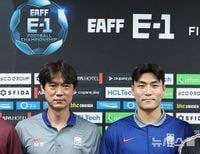South Korea is back on home soil for the 2025 EAFF E-1 Football Championship, marking the first time in six years that this prestigious East Asian tournament returns to the country. The opening match on July 7th at Yongin Mir Stadium saw the national team, under the guidance of veteran coach Hong Myung-bo, take on China in what is expected to be a fiercely competitive showdown.
Historically, South Korea dominates this competition, holding the record for the most men's titles with five championships to their name, including the last triumph on home ground in 2019. This year, they are aiming for their sixth title, with matches hosted across three venues in Gyeonggi Province: Yongin, Suwon, and Hwaseong.
Despite the prestige, the tournament is not scheduled during FIFA A-match windows, which means many of the Korean stars playing overseas, such as Tottenham's Son Heung-min and PSG's Lee Kang-in, are absent. Instead, the squad is primarily composed of K-League and J-League players, making this an excellent opportunity for domestic talent to shine on the international stage and for coach Hong to experiment with new tactical approaches ahead of the 2026 World Cup.
In total, nine players received their first call-up to the senior national team for this tournament, including Kim Tae-hyun from Kashima Antlers, Byun Jun-soo of Gwangju FC, and Lee Ho-jae from Pohang Steelers, who has been in impressive form this season with eight goals already. The competition within the squad is fierce, with newcomers like Lee Ho-jae challenging established veterans such as Joo Min-kyu for starting roles.
The opening match lineup featured goalkeeper Jo Hyun-woo, with a defensive line consisting of Lee Tae-seok, Kim Ju-sung, Park Seung-wook, and Kim Moon-hwan. Midfield duties were handled by Park Jin-seop and Kim Bong-soo, while the attacking midfield included Lee Dong-gyeong, Kim Jin-gyu, and Moon Seon-min, supporting the lone striker Joo Min-kyu.
The game kicked off under a humid summer evening sky, but despite the excitement, attendance was notably sparse. Unlike the 2019 Busan tournament where thousands filled the stands, this time the Yongin Mir Stadium had many empty seats. Factors such as a weekday match and the sweltering heat likely contributed to the low turnout, but the atmosphere was still charged with anticipation.
South Korea wasted no time asserting dominance. In the 8th minute, Kim Moon-hwan made a penetrating run down the flank and delivered a precise pass to Lee Dong-gyeong, who curled a left-footed shot into the net, breaking the deadlock. The home crowd erupted as the team took an early lead.
Building on that momentum, South Korea doubled their advantage in the 21st minute. Lee Tae-seok sent a well-placed cross from the left wing, which veteran striker Joo Min-kyu met with a powerful header, leaving the Chinese goalkeeper helpless. The 2-0 lead at halftime reflected South Korea's control and tactical discipline.
China, on the other hand, arrived in a period of transition and uncertainty. After failing to qualify for the upcoming World Cup, their head coach Branko Ivankovic was replaced by Dejan Djurdjevic, the U-20 team coach, who is serving as interim manager for this tournament. Their squad featured goalkeeper Yan Junling and a mix of experienced defenders and young attackers, including 2006-born striker Wang Weidong, aiming to end an eight-year winless streak against South Korea.
However, South Korea's dominance in the head-to-head record is stark, with 23 wins, 13 draws, and only 2 losses historically. Moreover, the Korean team has won the last five encounters against China since the 2019 AFC Asian Cup, not conceding a single goal in those matches, underscoring their defensive solidity.
Coach Hong Myung-bo has described this tournament as a "war under the guise of a test," emphasizing the fierce competition within the squad as he evaluates players for the upcoming World Cup. His focus on building depth and testing tactical variations is clear, especially with so many domestic players eager to make their mark.
The tournament schedule is packed, with South Korea set to face Hong Kong on July 11th and Japan on July 15th, both matches to be held at Yongin Mir Stadium. The Japanese team, defending champions and hosts of the 2022 edition, are themselves undergoing a transformation, introducing 12 new players, all from the J-League, including veteran fullback and captain Yuto Nagatomo, formerly of Inter Milan.
Meanwhile, the women's national team is also competing in the EAFF E-1 Championship, facing China, Japan, and Chinese Taipei in matches spread across Suwon and Hwaseong. Despite injuries to key players like Choi Yu-ri and captain Lee Young-ju, coach Colin Bell is looking to experiment with new lineups combining fresh talent with experienced stars such as Ji So-yeon and Lee Geum-min.
The men's and women's matches are broadcast live on TV Chosun and Coupang Play, providing fans with access to the region's top football talents. As the tournament progresses, all eyes will be on the performances of these emerging players, who could shape the future of Korean football on the world stage.
While the opening night attendance left room for improvement, the quality on the pitch and the stakes involved promise an exciting tournament ahead. South Korea's blend of youth and experience, combined with Hong Myung-bo's strategic vision, sets the stage for a compelling campaign as they chase their sixth EAFF E-1 Championship crown.


